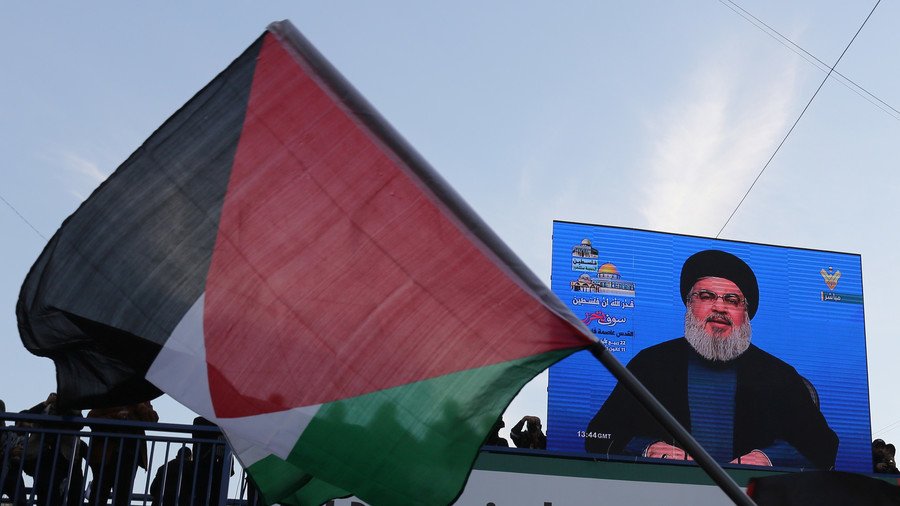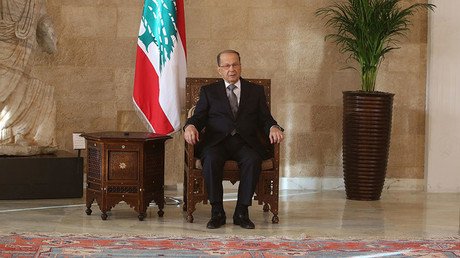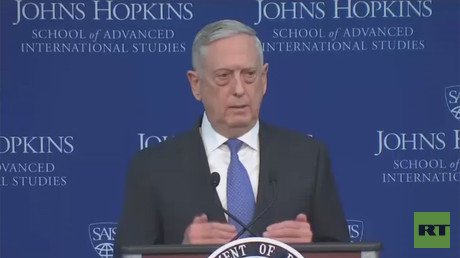Lebanon looks to Hezbollah to resolve internal clashes, as Israel’s war threats reach fever pitch

Lebanon is a pressure cooker which could blow at any moment, but don’t worry about confused US policy. Israel’s threats to invade are not irking the Lebanese, but many wish Hezbollah would end a local Shiite-Christian spat.
America’s confused position in Afrin, northern Syria, is not the only location in the Middle East where Washington’s loyalties are at odds with the reality on the ground. Lebanon, a country once called the ‘Switzerland of the Middle East’ for its Western pretentions, is now what many call a failed state which is consumed by corruption. And a confused one, for Washington to grapple with.
Lebanon is one of the highest net recipients of US military aid and because of its unique location (bordering Israel) and its dominance by Iranian-backed Hezbollah, that makes it a special case in the eyes of Washington. Indeed, only recently when Israel threatened to attack, it was the US which “pledged” support for the Lebanese Army, which it erroneously believes acts as a “counterweight” to Hezbollah. Is the US misinformed and comically out of touch of the recent developments in Lebanon, or is it simply confused about the realities on the ground?
A lot has changed since the 2006 invasion of Lebanon by Israeli forces. Recently, President Michel Aoun made it very clear that the Lebanese Army would support Hezbollah in attacking the Israel Defense Forces (IDF), if Israeli forces entered the country. Given this stark change to 2006, when the Lebanese Army didn’t fight Israel in the south, this new situation would put two US allies at war with each other – the IDF and the Lebanese regular army.
This presents Washington’s foreign policy hacks with a conundrum: does this abnormality of military support act as an incendiary device to pushing Israel to invade Lebanon (for a third time), or simply mean that Israel will merely threaten to do so more than it normally would, without going ahead? Are Israel’s threats strong words from an empty stomach?
In recent weeks, barely a few days pass without Israel making another threat to invade. Israeli Defense Minister Avigdor Lieberman recently said that Israel would not let Beirut’s residents go to the beach (like they did in 2006) while the south of their country was at war (and Israelis in Tel Aviv were in bomb shelters). In the same week, he also accused Lebanon of illegally taking Israel’s territorial waters – for oil and gas exploration – which he called a “provocation,” resulting in a no-nonsense response from Hezbollah: it will be war if you go there. Concurrent to these statements, an IDF spokesman also warned of war if Iran’s weapons facility, rumored to be in Lebanon, started production.
None of the Israeli threats stirs the average Lebanese though, even though in recent months a massive IDF build-up on the Lebanese-Israeli border has been ongoing.
A good barometer of how worried people are about stability in Lebanon can be found at the bank, where interest rates linked to the local currency indicate whether people are panic selling their lira; another one is inflation in supermarkets.
#Israel is ready for all-out ground invasion of #Lebanon in case of military conflict with Beirut https://t.co/PKNPEpIkoI
— RT (@RT_com) 2 февраля 2018 г.
But the best one is without a doubt the price of black market guns. Lebanon has one of the highest concentrations of guns in the world. Yet in the last few months, gun dealers are bemoaning how a Syrian war in its twilight stage, combined with a period of no car bombs or assassinations in Lebanon for at least two years, is forcing prices down to record lows. Two years ago, a brand new Russian Viking pistol was selling on the streets of an Armenian neighborhood in Beirut for over US$2,200; until this Christian-Shiite spat, the price was as low as $1,300.
Yet there is something which the Lebanese really fear and which might spike prices of weapons, certainly assault rifles. In recent days, Lebanon’s house speaker, Nabih Berri, was called a “thug” by Aoun’s son-in-law, Foreign Minister Gebran Bassil – a man who has a rare talent for poorly-timed or inappropriate statements – leaving the elderly Shiite figurehead somewhat riled. Not wishing to rise to the bait himself, the defamed gentleman in question left it to his loyal militias to enter neighborhoods in Christian areas, burning tires and firing AK47s into the air – managing to pull off an impressive impersonation of “thugs” to boot.
But it's no laughing matter. Many Christians are worried that things could escalate and leave Lebanon vulnerable.
“This can be really dangerous for Lebanon,” a Christian shopkeeper in an affluent Christian area in Beirut tells me. “This is what started the civil war, exactly this…”
“People now will start buying AKs which will push the price up because of these thugs, not because of Israel’s threats,” he adds, while showing me a compact pistol which he says he paid $2,500 for, still glistening in oil.
The ‘demonstrations’, which lasted three days and included the house speakers’ thugs closing the airport for two hours and which also pitched them against a gun-toting Christian neighborhood which scared them away, could get out of hand. This is what the Lebanese fear more than anything. An escalation of rival groups’ anger which could result in just one death – sparking a state of emergency, akin to a civil war.
Shake-up of power in Lebanon
Under normal circumstances, nobody believes that the Israelis would be so stupid to invade, given Hezbollah’s new strength and experience, following Syria and its latest missiles acquired from Iran. But if the country was in chaos, this could be more likely as it would be an opportunity that might not come around again.
The current row is about the house speaker’s own Shiite power base being threatened by the Christian president’s shake-up, allotting top military jobs to Christians and (perhaps) not getting his fair share from oil and gas ‘bonuses’. Corruption is the core issue, although Lebanon’s parliamentary elections are also making the country’s ruling warlords nervous, excluding Hassan Nasrallah, the Hezbollah leader, who has never looked more confident or relaxed in his TV speeches.
Perhaps he chuckles to himself when he hears of the US talking about supplying the Lebanese Army with more weapons, when hardly anyone in Lebanon believes that it is any real match for Hezbollah, regardless of the hardware it might have.
‘Drug dealing’ Hezbollah must be banned in UK - US counter-terror expert https://t.co/8Kror8OEPapic.twitter.com/njbubc4J4T
— RT (@RT_com) 25 января 2018 г.
Some here argue that it will be Nasrallah who puts the house speaker’s armed thugs in order, as Hezbollah wants peace here in Lebanon more than anyone. Nasrallah may well be content, as he’s holding all the aces. He has his own Christian president who the West believes is in its own pocket and will protect Lebanon and Hezbollah against any regional hegemony either in Riyadh or Tel Aviv overstepping red lines. It doesn’t really get any better than that. Nasrallah also probably believes that US President Donald Trump would not allow the Israelis to attack Lebanon, where the national army is US-supplied and ready to hit back. It would make the US president look stupid and bewildered, and Washington’s foreign policy appear hit and miss. Chocolate cake. With candles.
There are even those who believe that the constant funding of the Lebanese Army is, in itself, a smart way of both deterring Israel from invading and making its political class an even more astute enemy of Iran. But this merely strengthens the Hezbollah leader even more.
In the meantime, in many Christian areas in Beirut the normal price of a used AK47 (around $1,100 to $1,200) jumped now to $1,600 because of the local clashes. Many Christians are worried that the speaker’s mob will spark a turf war. “The few [Christians] who didn’t have one before are now under pressure from friends to get one,” Philippe, a restaurant owner tells me before smiling. “Of course, I have one. We look now to Nasrallah to intervene and stop these incidents even though it’s not his people.”
The statements, views and opinions expressed in this column are solely those of the author and do not necessarily represent those of RT.
















